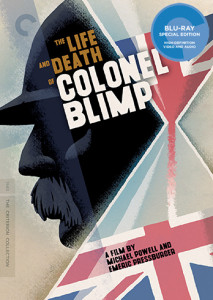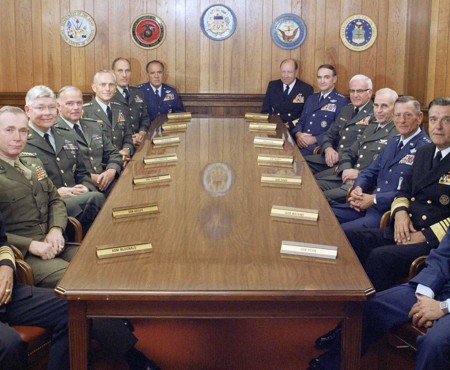How fitting it is that The Criterion Collection should release Monsieur Verdoux and The Life and Death of Colonel Blimp on Blu-Ray in the same month. Both are films respectively searching for morality in World War II’s wake and midst, crafting two of the richest, most multitudinous characters in cinema in the process. Chaplin reveals a planet irrevocably corrupted by Auschwitz, while Michael Powell and Emeric Pressburger wonder what effect WWII will have on a quintessentially British way of life. A humbler aim than Chaplin’s, perhaps, but the film that follows plays that smaller focus into one of the vastest movies.
The Archers bring out General Clive Wynne-Candy’s (Roger Livesey) remarkable life through the smallest insights. His career militarism is established not in shots of him during one of the three wars in which he serves but of the restless addition of game trophies in his rarely occupied house during peacetime. He forms a close friendship with a German officer, Theo (Anton Walbrook) selected at random to duel him for a diplomatic insult, a game willingness to make ties with opponents that subconsciously informs his naïve assumption that everything will go back to normal after the First World War. His belatedly realized love for the woman (Deborah Kerr) who marries Theo brings shades of her back as he grows older and she remains young, a measure of wistful longing that comforts and torments in equal measure.
Powell’s mastery of form matches Pressburger’s nuanced script. The painted skies of a battlefield contain no shelling or rows of men set to go over the top, merely the sound of birds tentatively chirping again with the official armistice that closes WWI. The aforementioned diplomatic scuffle in Berlin plays out in a brilliantly comic sequence cutting between Candy on the top floor of a club, his propagandic opponent below, and the triangulating point of the orchestra each party bribes to either play or stop playing a song tied to uncomfortable memories. Even Powell’s simpler shots are overwhelming, like one that adds power and import to Walbrook’s weary, quiet monologue of escaping Nazism with its respectful hold on a medium-close-up.
An old story relates a woman happening upon Picasso in a café and requested he sketch her on a napkin. He quickly did so and requested the equivalent $5000. When the aghast model said it only took him two minutes to draw, Picasso replied, “No, madam, it took me my whole life.” Colonel Blimp reflects its cartoon source material in its initial impression of Candy as a bloated has-been, red-faced from outrage and bathhouse steam. But the Archers traverse an entire social and personal history to get back to that farcical image, retroactively deepening it with wisdom gained over years but also grown more stubborn. Candy must accept that reality has changed as much as he by renouncing his myopic view of military good form for the sake of victory necessary at any cost, but something will be lost with him that can never return.
Technical Specs
 In a word, astonishing. Criterion’s transfer, sourced from a new 4K restoration, is quite possibly their best ever, eliciting new dimensions of color timing and textured lighting that picks up on the incredible textures of the age makeup and hair. This movie looks so great even the acting seems to have improved from the last time I watched it, confirming Blimp as the sort of film in which all the elements of style and craftsman design and acting play together in a harmony that improves when any one element is highlighted by loving treatment. An uncompressed mono soundtrack may not be able to wow on the same level, but it gets a robust, crisp rendering that complements the carefully ordered visuals.
In a word, astonishing. Criterion’s transfer, sourced from a new 4K restoration, is quite possibly their best ever, eliciting new dimensions of color timing and textured lighting that picks up on the incredible textures of the age makeup and hair. This movie looks so great even the acting seems to have improved from the last time I watched it, confirming Blimp as the sort of film in which all the elements of style and craftsman design and acting play together in a harmony that improves when any one element is highlighted by loving treatment. An uncompressed mono soundtrack may not be able to wow on the same level, but it gets a robust, crisp rendering that complements the carefully ordered visuals.
Extras
Criterion’s new Blu-Ray ports over the old DVD’s commentary track that trades between separate recordings of Powell and Martin Scorsese, who supplements Powell’s deliberate pace and anecdotal tidbits with his usual breathless, ebullient style. Scorsese is all over this disc, having spearheaded the negative’s restoration in the first place, a restoration he demonstrates in one of the features. A new video introduction not only touches upon details of the film and its influence on Scorsese but memories of how impossible it was to see back in the day, reemphasizing the need for its preservation.
Stealing the show, however, is Scorsese’s editor (and Powell’s widow), Thelma Schoonmaker, whose “Optimism and Sheer Will” interview provides tender, eloquent insight into the personal nature of such an epic. An older documentary, “A Profile of The Life and Death of Colonel Blimp and some galleries of production stills and original Blimp cartoons add some final pieces of lighter context, while the disc booklet features a lengthy essay from the incomparable Molly Haskel.
Overall
One of the greatest films of all time has been given one of Criterion’s finest packages, right down to the case cover. Highest recommendation.
Director: Michael Powell and Emeric Pressburger
Year: 1943
Distributor: The Criterion Collection




















